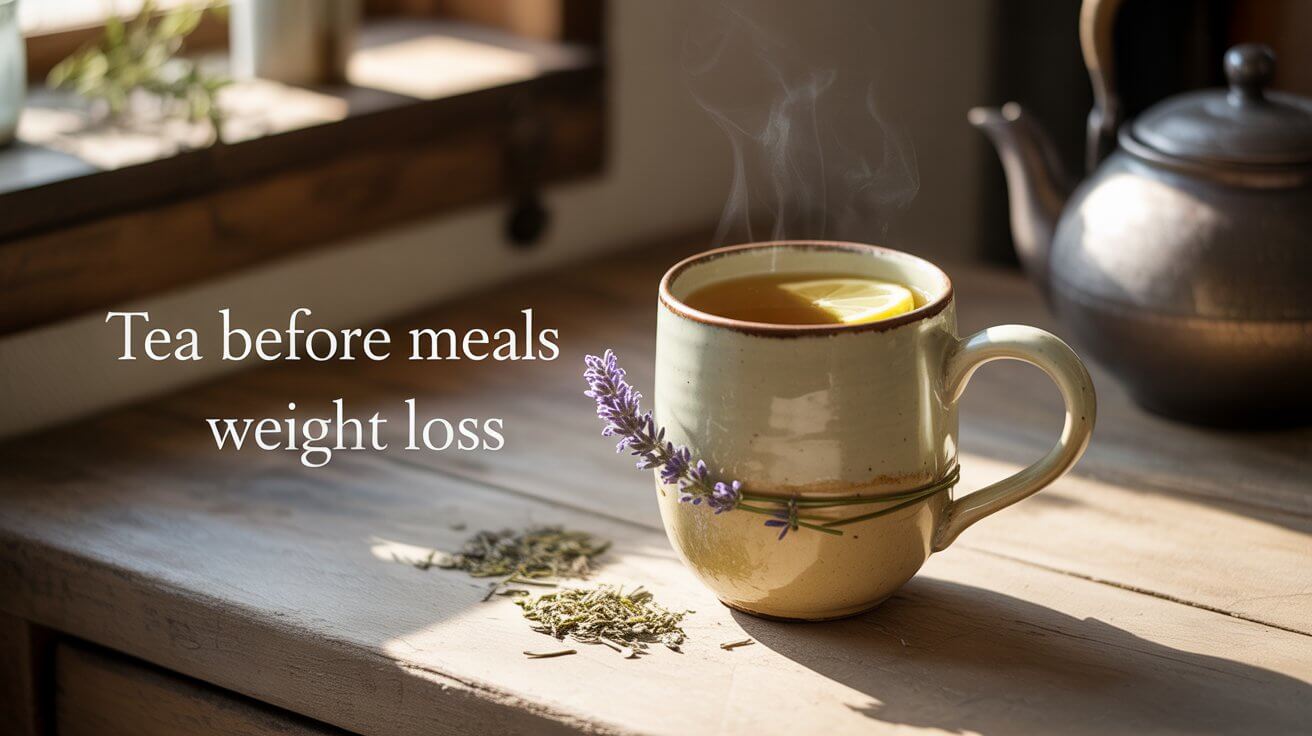The idea that a simple cup of tea before meals can help you eat less and lose weight sounds almost too easy but modern research shows there’s more truth to it than you might expect.
As of 2025, nutrition experts continue to explore how pre-meal tea drinking influences appetite hormones, digestion, and fat metabolism. While tea alone isn’t a magic bullet, it may act as a science-backed appetite regulator when used strategically.
Let’s explore what new research says about how drinking tea before meals affects your appetite, metabolism, and weight management.
How Drinking Tea Before Meals Affects Appetite and Digestion
One of the simplest but most effective ways tea supports weight control is through appetite regulation. Warm liquids especially green, oolong, and herbal teas help create a mild feeling of fullness before eating. This pre-meal satiety can lead to naturally reduced calorie intake without the discomfort of dieting.
Why it works:
-
Warm fluids gently expand the stomach, signaling early fullness.
-
Compounds in tea like catechins and polyphenols influence ghrelin and leptin hormones that control hunger and satisfaction.
-
Herbal teas like ginger and peppermint stimulate digestion, preparing the body to break down food efficiently.
According to a 2024 study published in the International Journal of Obesity, participants who drank green tea 30 minutes before meals consumed an average of 12% fewer calories than those who drank water.
Visual Tip: Add a simple infographic comparing calorie intake between “Tea Before Meal” vs. “No Tea” groups for easy user engagement.
Best Types of Tea That May Help You Eat Less and Support Weight Loss
Not all teas are equally effective for weight control. Here’s what recent research (2024–2025) highlights as the most beneficial types:
1. Green Tea – The Metabolism Booster
Rich in catechins (EGCG) and moderate caffeine, green tea enhances thermogenesis your body’s calorie-burning process.
-
A 2025 review in Nutrients found that daily green tea intake increased fat oxidation by up to 17%.
-
Ideal for: boosting metabolism and reducing body fat percentage over time.
-
Pro tip: Drink 20–30 minutes before meals to prevent overeating.
2. Oolong Tea – Balances Fat Metabolism
Oolong tea combines the benefits of both green and black tea.
-
It supports lipid metabolism, helping your body use fat for energy.
-
A 2024 clinical trial found oolong tea drinkers experienced 3% higher calorie burn for up to two hours after drinking.
Expert insight: Many fitness enthusiasts use oolong tea pre-meal for a gentle metabolic kick without jitters.
3. Black Tea – Gut Health and Weight Regulation
Black tea’s theaflavins promote healthy gut bacteria now known to influence appetite control and fat storage.
-
In a 2025 Gut Microbiome Review, black tea was linked to improved microbial diversity, supporting healthy weight balance.
-
Great choice for those who prefer a bold flavor and moderate caffeine.
4. Herbal Teas – Appetite Calming and Debloating
Caffeine-free herbal teas support digestive ease and appetite control.
-
Peppermint: Reduces cravings, especially for sweets.
-
Hibiscus: Helps reduce water retention and mild bloating.
-
Ginger: Boosts metabolism and promotes satiety.
For convenience, ready-to-drink slimming blends such as All Day Slimming Tea combine these herbs with metabolism-supporting botanicals ideal for a single, balanced solution.
The Science: Does Tea Really Suppress Appetite?
Several studies from 2023–2025 provide strong support for tea’s role in appetite control and metabolism enhancement:
-
Green tea catechins increase fat oxidation and calorie burning during rest.
-
Herbal teas promote relaxation, reducing stress-eating tendencies.
-
Warm liquids before meals slow eating pace and enhance fullness cues.
A 2025 meta-analysis in the Journal of Nutritional Biochemistry concluded that tea-based interventions resulted in an average weight reduction of 1.2–2.8 kg over 12 weeks, particularly when paired with calorie awareness and light activity.
Expert takeaway: Tea doesn’t replace healthy habits it amplifies them.
Best Time and Way to Drink Tea for Weight Management
Timing and consistency are key. Here’s what works best:
-
Drink tea 20–30 minutes before meals: It curbs appetite naturally.
-
Choose unsweetened tea: Added sugars negate fat-burning benefits.
-
Limit caffeine in evenings: Switch to herbal teas at night.
-
Pair with mindful eating: Focus on slow bites and awareness of fullness.
Many nutritionists now recommend starting with 1 cup before lunch and dinner for sustainable results.
Are There Any Downsides or Risks?
Tea is safe for most adults, but moderation matters.
-
Too much caffeine (from green, oolong, or black tea) can cause jitters or disrupt sleep.
-
Interactions: Tea may affect iron absorption or interfere with certain medications (especially for blood pressure or thyroid).
-
Balance is key: Tea should complement, not replace, nutritious meals or exercise.
Always consult a healthcare provider if you’re on medication or have metabolic conditions.
Practical Tips for Using Tea to Support Weight Loss
If you’re just starting out, use these simple, research-backed steps:
Begin with one unsweetened cup before your main meal.
Alternate between green, oolong, and herbal blends for variety.
Avoid sweeteners or milk.
Stay consistent long-term habits drive results.
Consider All Day Slimming Tea or other herbal blends if you prefer a convenient, pre-formulated option.
The 2025 Trend: “Pre-Meal Tea Rituals” for Mindful Eating
A growing wellness trend in 2025 is the “pre-meal tea ritual” a mindful pause before eating. Nutritionists say this helps slow down, center your focus, and tune in to hunger cues making overeating less likely.
This approach aligns perfectly with tea’s natural calming and digestive properties, reinforcing both physical and mental aspects of healthy eating.
Conclusion: Can Tea Before Meals Help You Lose Weight?
Yes when used intelligently. Drinking tea before meals can reduce calorie intake, improve digestion, and boost metabolism, but only when paired with a healthy lifestyle.
The most effective teas green, oolong, black, and select herbal blends work best when consumed consistently and strategically.


Leave a Reply